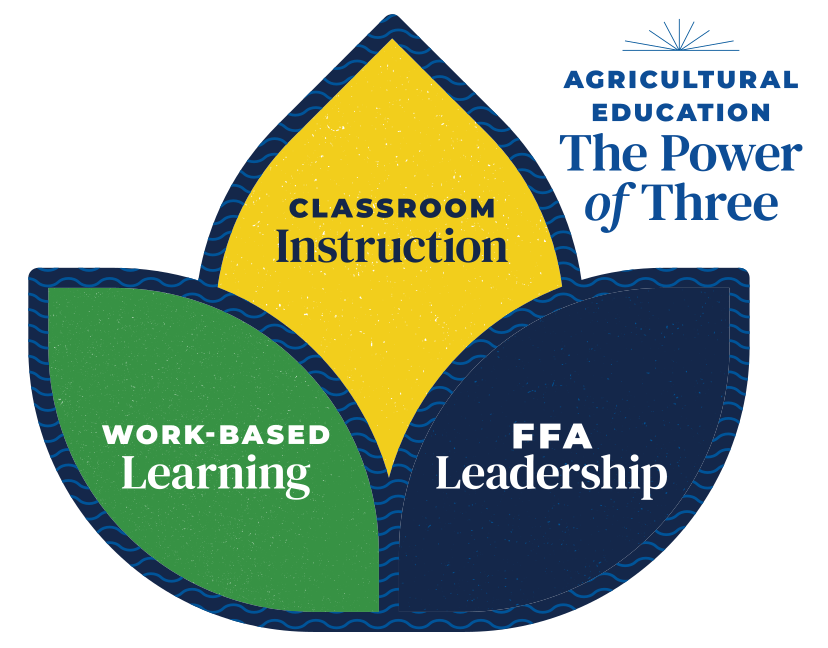For Parents or Guardians
Guide your child to a successful future
Trying to help your student determine the best path for their middle school and high school experience? Whether they’ve always considered pursuing a career in business, STEM, a technical proficiency, production agriculture, or have yet to determine their next steps, agricultural education can set them on a path to a rewarding career and civic-minded leadership.
Students who actively participate in their school’s agricultural education program and FFA reap the benefits of having a sense of belonging, having access to an advisor, and exploring opportunities they otherwise would not have been exposed to.

The impact of
Agricultural Education

Why Agriculture?
The surprising benefits of agricultural education + FFA
Start a business and gain real work experience while still in high school. Learn more at saeforall.org and ffa.org.
Earn dual credits in classes that qualify for the Indiana Honors and Technical Honors Diplomas*.
Compete at the local, state, and national level in everything from science fairs and business management to public speaking and musical talent.
Learn more about the different competitive events:
Prepare for success in life after graduation, whether that’s working, enlisting, attending a technical school, or seeking a 4-year college degree.
Develop leadership skills to become the future leaders who will feed, clothe, fuel and sustain the world.
Make lifelong friendships and find a sense of community within your school.
Become an informed consumer and community-focused citizen who values global agriculture, food, fiber, and natural resources.
*Agricultural education is already primed to align with diploma changes being discussed at the state level. If Indiana moves forward with transitioning to the Indiana GPS Diploma and GPS Diploma Plus beginning with the class of 2029, agricultural education’s model of offering dual-credit classes, incorporating work-based learning through agricultural education, and providing certification and college credit opportunities in high school will fit perfectly into the new requirements.
*Students enrolled in agricultural education see 6‐7% higher graduation rates and increased community and industry involvement in high school.

The three component model of agricultural education
Agricultural education at its best engages students in all three aspects, creating a comprehensive educational experience preparing them to succeed in life after graduation.

Classroom Studies + Laboratory: Classes under the umbrellas of agricultural education span many different industries including veterinary sciences, biotech, mechanics and engineering, horticulture, agribusiness, and environmental science.
Work-Based Learning through Agricultural Education: Experiential learning through the implementation of a Supervised Agricultural Experience (SAE), which can be entrepreneurship/starting a business, an internship, or community service, all with the guidance of an advisor. Learn more at SAEforall.org and ffa.org.
FFA/Leadership Development: FFA is the nation’s premier youth leadership organization preparing members for careers in the science, business, and technology of agriculture. FFA offers students opportunities to serve, lead, and compete at the local, state, and national level, travel domestically and internationally, and meet students across the state and country who share their similar interests and passions.
How to Get
Involved
To join FFA, you must be enrolled in an agriculture course at your school. Contact your school counselor or agriculture teacher to enroll in an agricultural education program and join FFA.
Don’t have Agricultural Education or FFA at your school? Share this website with your local school administration, from the school board and principal to your school’s guidance counselor. You can also see our steps for starting an agricultural education program and FFA Chapter.
Here are some faqs to get you started:
Through agricultural education, students are provided with opportunities for hands-on learning, mentorship, leadership development, and personal growth, leading them to become future chemists, veterinarians, government officials, entrepreneurs, farmers, bankers, international business leaders, teachers and premier professionals in more than 350 careers. Discover potential careers at AgExplorer.FFA.org. And even if a student chooses another profession to pursue outside of the umbrella of agriculture, they still leave high school as informed consumers and community-minded citizens, aware of the importance and value of global agriculture, food, fiber, and natural resources systems.
Students are offered mentorship and guidance to start their own business or participate in an internship to gain real work experience, known as a Supervised Agricultural Experience (SAE). Learn more at saeforall.org and the FFA SAE Video Library.
Students can simultaneously earn Technical and Academic Honors designations upon successful completion of coursework, providing a springboard for work, technical school, collegiate and post-grad opportunities in a variety of fields.
FFA offers an opportunity for students to learn skills and gain confidence through competitions at local, state, and national levels in numerous categories. It’s often a way of bringing pride to the school and community in the same way sports or performing arts may do for schools.
While a preconceived notion might suggest agricultural education is only for students interested in pursuing careers in production agriculture, students actually learn a wide variety of applicable skills, including science, math, public speaking, leadership, management and technology.
Agricultural education plays a vital role in preparing students for more than 350 career paths,, and instills transferable values and life skills like self-sustainability and leadership.
Currently, more than 1,000,000 students participate in formal agricultural education instructional programs offered in grades 7-12 throughout the 50 states and three U. S. territories.
Acedemic Success
This Purdue University study provided the first baseline of FFA members’ academic success and
revealed that FFA members possess academic scores that are higher than the national average. FFA members show higher ACT and SAT scores on
average than the 2018 high school graduating class average. FFA members have a collective average ACT score of 23.5, compared to the national average of 20.8. FFA members have a collective
average SAT score of 1152, compared to the national average of 1068. Additionally, the average high school grade point average of FFA members is
a 3.69 out of 4.0 on an unweighted grade point average scale, which also means that 96 percent of members represented in this study are either A
or B students.
Career Readiness
The same study revealed that involvement with FFA is correlated with higher perceptions of career readiness.
Results of the study reveal that agricultural education students/FFA members possess skills and competencies typically associated with career readiness. FFA members scored a 73.1 out of 90 on a scale 2 measuring their communication skills, decision-making skills, skills in getting along with others, learning skills, management skills, skills in understanding themselves and skills working with groups. On an assessment 3 measuring their engagement, cognitive maturity, and innovativeness, FFA members scored a 109.8 out of 130. FFA members assigned themselves an average score of 85.2 out of 100 on a scale 4 measuring their ability to communicate in a variety of settings, including in public, a meeting, a group, a dyad, and with acquaintances, strangers, and friends. These results support the idea that FFA members possess the competencies that are critical in today’s workforce.
FFA Chapters can be found in 91 of the 92 counties in Indiana. You can locate chapters near you with FFA’s Chapter Locator. If your school does not currently offer agricultural education or FFA, you can find more information on how to start a program here.
For information on how to start an agricultural education program in your school, visit the links below.
Testimonials





